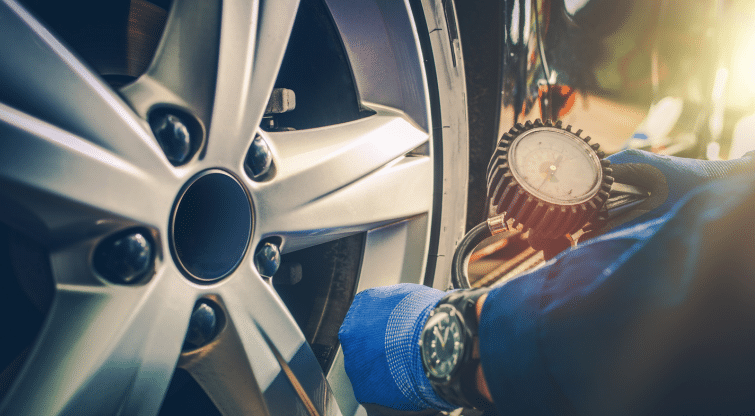When it comes to keeping your tires inflated, you have a choice. You can fill up with air, like people have done for decades, or you can use nitrogen. What are the pros and cons of each? Let’s take a closer look.
Nitrogen
Remember when you studied molecules in science class? Molecules are the smallest amount of a substance that still carries its properties. Nitrogen molecules are larger and slower than the molecules in air. As a gas, nitrogen also is drier. These properties give nitrogen some advantages.
PROS
-
- Nitrogen won’t seep out of your tires as quickly as air because of its larger, slower molecules. That will help you to maintain your tire pressure longer.
- The moisture naturally found in air can cause changes in temperature. With nitrogen, there is no moisture and therefore it is less susceptible to temperature changes that affect tire pressure.
- Nitrogen is especially good for locations with very high or low temperatures. It is often used in race cars, heavy vehicles, and aircraft because it is nonflammable and able to more easily maintain its temperature.
- Nitrogen will not react to rubber, steel, or any of the tire’s components. There is no oxidation which can damage tires. That should help preserve your tire over time.
CONS
-
- You most likely will pay to inflate your tires with nitrogen. The initial charge to remove the air and fill them with nitrogen can cost about $30 per tire. Then, it will be about $7-10 per tire for topping it off as you need more nitrogen.
- Nitrogen may not be significantly better than air at maintaining tire pressure. Consumer Reports found only a 1.3 psi difference between air and nitrogen over the timeframe of a year.
- There is no scientific evidence that nitrogen helps with fuel economy.
- It is harder to find places to fill up with nitrogen. You will have to search for locations that offer nitrogen, even for a fee.
Note: If your tire is low and there is no place to get nitrogen, you can top your tire off with air. It won’t harm your tires, but it will reduce the effectiveness of the nitrogen alone.
Air
You may be surprised to learn that air is composed of mostly nitrogen. In fact, the mix is 78% nitrogen, 21% oxygen, and about 1% of other gases. Air, which has been used to inflate tires for over a century, also has its advantages.
PROS
-
- Air is often free. If it costs, it is minimal such as a dollar or two.
- Air is readily available. You can find it at gas stations, convenience stores, wholesale clubs, tire shops, and more.
- While air loses pressure over time, its rate is close to that of nitrogen. Plus, with air, drivers are more likely to check in often versus relying on nitrogen to stay pressurized.
CONS
-
- You will experience more pressure changes with air. Air is affected by temperature changes due to water vapor in its mix. However, it is worth noting that most tire shops have moisture separators that limit the amount of water vapor.
- The oxygen in air can cause oxidation, which can make rubber brittle over time.
- You will have to fill your tires more often when you have air versus nitrogen.
Tire Pressure is Key
When you fill up with nitrogen, you get a green cap on your tire valve. When you fill up with air, your cap will be black. However, whether you use nitrogen or air, you still will fill your tires to the same recommended pressure. Check the inside of your door or your driver’s manual to find the right psi.
Maintaining the correct pressure helps your tires last longer, your car handle better, and could even help with fuel economy. Under or over inflated tires increase your risk of a blowout and increase wear and tear. No matter whether you use nitrogen or air, regularly checking the pressure of your tires is part of responsible vehicle maintenance.
Your car is one of your greatest investments. Protect it with the right insurance for added peace of mind.
Safe travels from all of us at California Casualty.
This article is furnished by California Casualty, providing auto and home insurance to educators, law enforcement officers, firefighters, and nurses. Get a quote at 1.866.704.8614 or www.calcas.com.
- 15 Items That Can Overload Your Power Strip - January 16, 2026
- Music & Arts Grant Recipients – 2025 - January 13, 2026
- A Legacy of Trust: CTA and California Casualty Celebrate 75 Years Together - January 13, 2026

